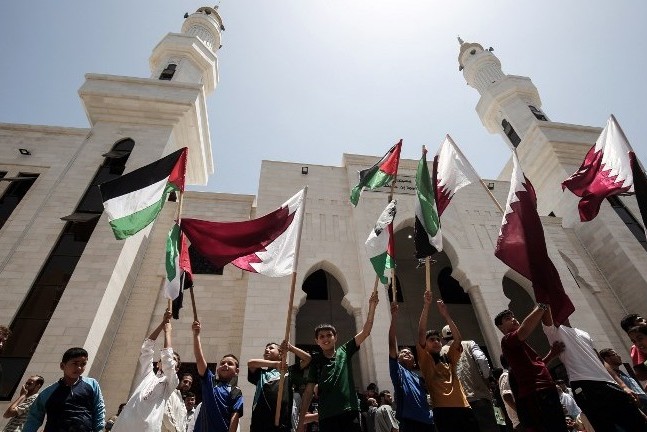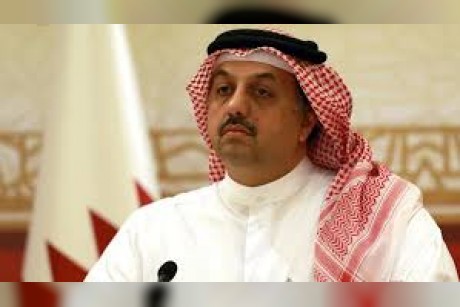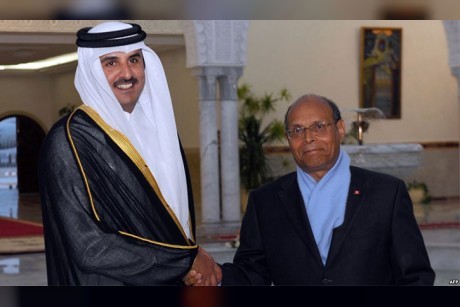As Gazans continue to participate in mass protests amid heightened frustrations at their dire humanitarian situation, Qatari aid and infrastructure projects in the besieged strip have been dying out following the blockade imposed on Qatar by Saudi Arabia, the UAE, Bahrain and Egypt since June 2017.
An Israeli study by the Institute for National Security Studies at Tel Aviv University found that the blockading quartet is working to stop the Qatari aid that enters through Israel from reaching the civilian population in Gaza. The researchers argue that Israel believes the Qatari support will help delay the inevitable confrontation between Israel and Hamas in the Gaza Strip.
The study stresses the difficulty and complexity of transferring the aid to Gaza since the blockade. Egypt has halted the movement of goods and raw materials from Qatar through the Rafah crossing and is pressuring Israel to do the same. The study suggests that increasing Qatari influence in Gaza would escalate tension between Israel and the Egyptian regime.
On March 17, the New Arab reported the formation of a US-Egyptian-Israeli committee to carry out humanitarian and relief tasks in Gaza, disregarding the Palestinian Authority and directly coordinating with US institutions linked to nongovernmental organizations in the Gaza Strip in order to maintain calm and avoid a humanitarian disaster in Gaza. The newspaper pointed out that the committee is basically working to reduce Qatar’s humanitarian role in the Strip, with which Egypt has become concerned as it struggles to regain control of the Palestinian dossier.
The chairman of Qatar’s Gaza Reconstruction Committee (QGRC), Ambassador Mohammed Al-Emadi, said in a press conference in Gaza Feb. 24 that there is great pressure on Qatar to abandon its humanitarian work in the Strip. Emadi noted in another press conference on Feb. 19 that his country will carry on providing assistance.
The QGRC was founded after the Israeli-Gaza war in 2012 with a grant from Qatari Emir Sheikh Hamad bin Khalifa Al Thani amounting to $407 million. Its main task was to implement housing, agricultural and health projects, in addition to paving roads and fixing infrastructure.
A source from the QGRC, speaking to Al-Monitor on condition of anonymity, said that while the committee has carried out 90% of its planned projects, “the money is running out, and we are yet to find out whether or not the grant will be renewed." The source noted that Emadi had stressed during his recent visit that Qatar will focus on relief and humanitarian aid and not development projects and infrastructure, projects currently stalled due to the difficult economic situation in the Strip. The Qatari funds announced during the International Conference on Palestine and Reconstructing Gaza in Cairo in 2014 only amount to a few million dollars out of the pledged billion in funds.
Political analyst and writer Hani Habib told Al-Monitor that Egypt sees the Gaza Strip as critical to Egyptian national security given the geopolitical situation linking the two regions. Cairo believes that Qatar’s role in providing humanitarian support to Gaza and its support of the Palestinian cause in general come at the expense of Egypt and squeeze it out of the picture. He stressed that the state of polarization resulting from the blockade on Qatar has directly affected Egyptian-Qatari relations.
“Israel seems to be two-timing both Qatar and Egypt. It is trying to please Qatar by allowing it to bring in its aid to the Gaza Strip, all the while winning Egypt over by claiming it is allowing the entry of the Qatari aid to Gaza to ward off a possible confrontation between Tel Aviv and Gaza,” Habib said. “Israel is counting on the US in the coming period to ease Egypt’s anger toward Qatar’s support to Gaza."
He continued, “The Gaza Strip is a consumer and vital market for Egyptian goods. Stopping Qatari aid serves Egypt’s economic and political interests.” He pointed out that excluding Qatar from the Palestinian scene was predictable since it was not an honest sponsor of the Palestinian reconciliation given its bias to Hamas, saying that Egypt has proven its efficiency in ending the division.
The head of the political science department at Al-Azhar University, Mukhaimer Abu Saada, told Al-Monitor that Egypt thinks of the Gaza Strip as its own backyard, and thus does not want any foreign intervention, particularly by Qatar, which supports political Islam groups strongly opposed by Cairo.
He explained that any interference would mean competing with Egypt, noting that Israel does not want to prevent Qatari aid from entering through its crossings for fear the security situation in the Gaza Strip will escalate. “Qatar is the only Arab country that has influenced Hamas' political decisions since Hamas leader Khaled Meshaal moved from Damascus to Doha. This why Israel does not want to exclude Qatar,” he said.
Abu Saada pointed out that Hamas will not accept the funding that the UAE may send through dismissed Fatah leader Mohammed Dahlan to the Gaza Strip to avoid alienating Qatar. “Hamas is well-aware that this would only aim to marginalize it and force it out of the political Islam circle, which includes Qatar, Turkey and Iran,” he added.
Political analyst Mustafa al-Sawaf said Israel will not respond to Egyptian pressure. “A recent Qatari grant in February had amounted to $9 million and aimed to ease the situation in the Strip and prevent it from imploding,” Sawaf told Al-Monitor.
Economic analyst Amen Abu Aisha told Al-Monitor that the Qatari aid and projects have failed to effect overall economic growth, noting that politically linked financing is conditional and seeks only to achieve a certain agenda.



